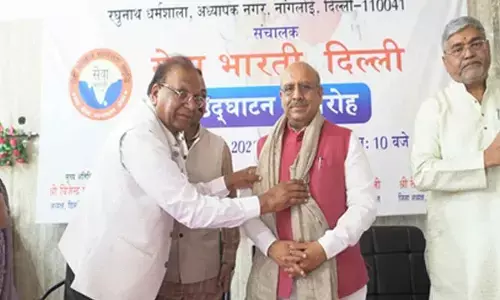Vemana, a doyen of philosophy

Kumaragiri Vema Reddy, popularly known as Vemana was a great Telugu philosopher and poet. His poems are known for their use of simple language and native idioms and discusses the subjects of Yoga, wisdom and morality. He is popularly called Yogi Vemana,
Early life and background
There is no consensus among scholars about the period in which Vemana lived. CP Brown, known for his research on Vemana, estimates his year of birth to be 1652 based on some of his verses. Other sources say he was born in the fifteenth, sixteenth and seventeenth centuries. According to Brown and Rallapalli Anantha Krishna Sarma, Vemana belonged to the Kapu (Reddy) caste. Vemana was the third and youngest son of Gaddam Vema, the king of Kondaveedu in Guntur. He was named Vema after his father.
Poetry and fame
Vemana composed numerous poems in vernacular Telugu. His poems are four lines in length and he conveyed his message in the first three lines. The fourth line, in majority of the cases- is the chorus Viswadabhirama Vinura Vema. He travelled widely across south India, acquiring popularity as a poet and Yogi. People really took to Vemana's poems owing to his simple language and sweet message. So high was the regard for Vemana that a popular Telugu saying goes ‘Vemana's word is the word of the Vedas.’ He is celebrated for his style of Chaatu Padyam, a poem with a hidden meaning.
There is an interesting story behind Vemana turning into a poet. As a youth, he used to be a vagabond and used to roam behind prostitutes and drain all the family wealth. He was brought to his senses by a friend. He then left all worldly pleasures and became a yogi. He starting writing poems on philosophy. When his friend enquired as to how he started writing about philosophy, he replied ‘Kaami gaka mokshagami kadu’ (One cannot be philosopher, if he hasn’t enjoyed worldly pleasures). This is believed to be first poem written by Vemana.
CP Brown translated most of Vemana's poems into English, when the British was ruling India. A large selection of his poems is part of the curriculum in many schools. In his honour, the Andhra Pradesh Government named a University after him in Kadapa in 2006 - Yogi Vemana University. Vemana was believed to have lived for some time in the Gandikota area of Kadapa.
Poetic style
Many lines of Vemana's poems are now colloquial phrases of the Telugu language. They end with the signature line Viswadhaabhi Raama Vinura Vema. There are many interpretations of what the last line signifies. His poems are of many kinds- social, moral, satirical and mystic in nature. Most of them are in ‘Ataveladi’ meter.
Popular poems
Vemana’s poems are so popular that they are passed on from generation to generation. Mothers and grandmothers teaching his poems to children and making them recite is a common practice in many Telugu households. ‘Uppu kappurambu’, ‘Eluka tolu’, Cheppuloni rayi’, ‘Gangigovu palu’ etc are some of his most recalled and recited poems.
.jpg)
Next Story








